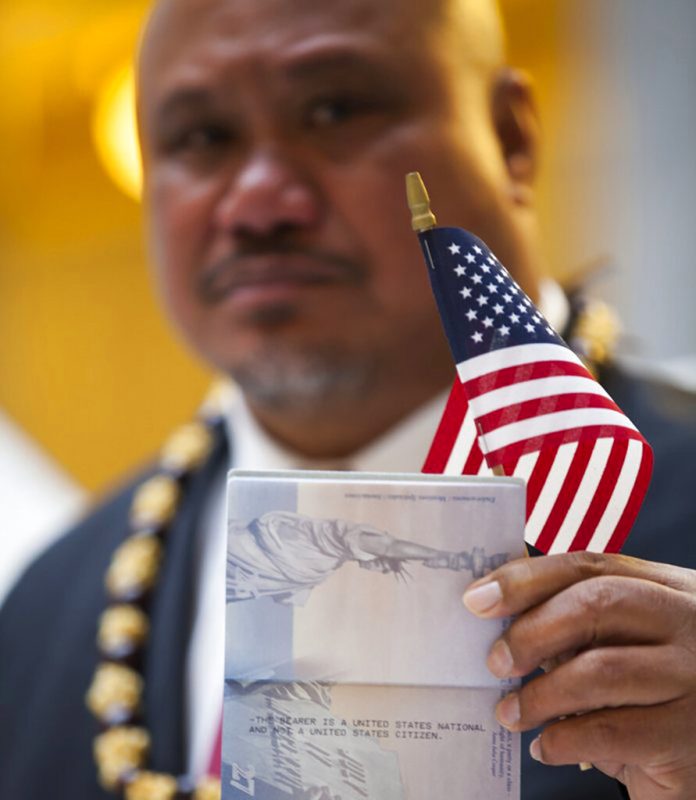
The U.S Supreme Court on Monday declined to consider whether American Samoans have full U.S citizenship at birth, a dispute that would have given the justices the opportunity to repudiate past rulings suffused with racist language that helped determine that those in U.S territories would not have the same rights as other Americans.
A group of American Samoans challenging the current law, in which people from the group of islands in the Pacific Ocean are considered U.S “nationals” at birth but not citizens, say it is a vestige of racist policies toward territories. They say that the Justice Department, in defending the law, and an appeals court, in upholding it, relied upon the so-called “Insular Cases,” a series of long-criticised early 20th century Supreme Court rulings. The Supreme Court’s decision not to hear the case means the lower court ruling remains in place.
The challenge was brought by three American Samoans who live in Utah: John Fitisemanu, Pale Tuli, and Rosavita Tuli, as well as the Southern Utah Pacific Island Coalition, an advocacy group based in Utah.
“The subordinate, inferior non-citizen National status relegates American Samoans to second-class participation in the Republic,” the challengers’ lawyers say in court papers. They note for example, that U.S nationals cannot run for president or serve in Congress. If living in a state, they cannot vote and are barred from certain occupations.
U.S nationals can live and work anywhere within the United States and can travel under a U.S passport, although the challengers’ lawyers note that their passports include a statement saying “NOT A UNITED STATES CITIZEN,” which they say carries a stigma. U.S nationals can apply for full U.S citizenship via an expedited process.
American Samoa, with a population of around 50,000, is one of five U.S territories, the others being Puerto Rico, Guam, the Virgin Islands and the Norther Mariana Islands. Puerto Rico, with about three million residents, is by the far the largest by population.
American Samoa is the only territory to which Congress has not extended birthright citizenship. No residents of territories can vote in presidential elections or elect voting members to Congress.
The Insular Cases were a series of rulings issued in the 1900s soon after the United States had acquired Puerto Rico and other territories in which the court said people in those jurisdictions did not have all the same constitutional rights as those living in the mainland.
In one 1901 case, Justice Henry Billings Brown referenced territories as lands “inhabited by alien races” who might not abide by “Anglo-Saxon principles.” Five years earlier, Brown had authored the notorious Plessy v. Ferguson ruling that gave the seal of approval to racial segregation. In a separate opinion in the 1901 case, Justice Edward Douglass White said the United States had the right to acquire “an unknown island, peopled with an uncivilised race,” without having to confer full constitutional protections. Several other rulings followed in which the theory that certain rights but not others applied to people in territories was further developed.
Civil rights groups had urged the Justice Department to abandon any reliance on the Insular Cases and side with them in asking the court to hear the American Samoan cases, but it declined to do so. Solicitor General Elizabeth Prelogar wrote in the government’s brief that the Justice Department is not relying on the Insular Cases in its arguments and that the appeals court had not done so either.
Along with the Justice Department, the government of American Samoa also urged the Supreme Court not to hear the case, saying the issue is one that should be determined through the political process, should American Samoans want to change the status quo.
American Samoan people cherish their “unique political status,” which is reflected in the fact that they are not born as U.S citizens, lawyers for the territory’s government said. The current political settlement allows Samoans to preserve their traditional culture, known as “fa’a Samoa,” the territory’s government argues.
“The American Samoan people have not yet reached consensus on whether to accept the privileges and responsibilities of birthright citizenship — but they firmly believe that any decision on birthright citizenship for American Samoa should come through the democratic process,” the lawyers added.
Of the current nine justices, two of them — liberal Justice Sonia Sotomayor and conservative Justice Neil Gorsuch — have expressed concern about the Insular Cases remaining on the books.
In a case decided in April in which the court ruled that it was not unlawful for people in Puerto Rico to be denied access to a federal benefits program, Sotomayor, whose parents were from Puerto Rico, dissented, saying that constitutional protections should not be determined through the political process. The Insular Cases, she added in a footnote “were premised on beliefs both odious and wrong.”
Gorsuch wrote a separate opinion urging the court to take up a case in which the Insular Cases could be reversed, saying the flaws within them are “as fundamental as they are shameful.”
The rulings include “ugly racial stereotypes” and “have no home in our Constitution or its original understanding,” he added.
SOURCE: NBC AMERICA/PACNEWS













